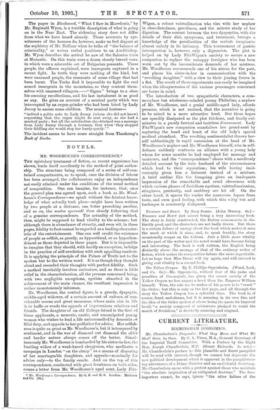NOVELS.
MR. WOODHOUSE'S CORRESPONDENCE.*
THE epistolary treatment of fiction, as recent experience has shown, lends itself excellently to the method of joint author- ship. The structure being composed of a series of self-con- tained compartments, so to speak, once the division of labour has been arranged, the collaborators enjoy an independence not easily attained under the conditions of the usual method of composition. One can imagine, for instance, that, once the general plan was agreed upon, such a book as Mr. Wood- house's Correspondence—we speak without the faintest know- ledge of what actually took place—might have been written by two people at a distance, one letter provoking another, and so on, the modus operandi thus closely following that of a genuine correspondence. The actuality of the method, then, might be supposed to lend vitality to the scheme ; but although there is abundance of vivacity, and even wit, in these pages, fidelity to fact cannot be regarded as a leading character- istic of the entertainment. One can well credit the existence of people as selfish, as greedy, as hypocritical, or as hypochon- driacal as those depicted in these pages. But it is impossible to imagine that they should, with hardly an exception, indulge in the practice of self-revelation with such appalling candour. It is applying the principle of the Palace of Truth not to the spoken but to the written word. It is as though they thought aloud and recorded their thoughts with perfect fidelity. Such a method inevitably involves caricature, and as there is little relief in the characterisation, all the persons concerned being, with two negligible exceptions, egotists absorbed in the achievement of the main chance, the resultant impression is rather monotonously inhuman.
Mr. Woodhouse, the central figure, is a greedy, dyspeptic, middle-aged widower, of a certain amount of culture, of con- siderable means and great meanness, whose main aim in life is to baffle or evade the appeals of impecunious relatives and friends. The daughter of an old College friend is the first of these applicants, a neurotic, exotic, and emancipated young woman who wishes to lead a life untrammelled by domestic ''r filial duty, and appeals to her godfather for advice. Her selfish- ness is quite as great as Mr. Woodhouse's, but it is tempered by sentiment, and in the war of diamond cut diamond the older and harder nature always comes off the better. Simul- taneously Mr. Woodhouse is bombarded by his sister-in-law, the bustling widow of a weak-kneed clergyman, who meditates a campaign in London " on the cheap " as a means of disposing of her marriageable daughters, and appeals—nominally for advice only—to the family oracle. And on the top of this correspondence, conducted with great frankness on both sides, comes a letter from Mr. Woodhouse's aged aunt, Lady Fitz-
• Mr. Woodhouse-s Correspondence. By G. E. and E. S. London: Methuen and Co. [6a.]
Wigan, a robust valetudinarian who vies with her nephew in close-fistedness, greediness, and the minute study of her digestion. The contest between the two dyspeptics, with the details of their diet, symptoms, and treatment, betrays a knowledge of the peculiarities of the malade imagineire almost unholy in its intimacy. This tournament of gastric introspection is, however, only a digression. The plot is helped on by Lady FitzWigan's anxiety to secure a new companion to replace the unhappy foreigner who has been worn out by the inconsiderate demands of her mistress. Mr. Woodhouse recommends one of his nieces for the post, and places his sister-in-law in communication with the "revolting daughter," with a view to their joining forces in a flat. The result of these experiments can easily be imagined when the idiosyncrasies of the various personages concerned are borne in mind.
The introduction of two sympathetic characters, a com- monplace but wholesome-minded young Philistine, a nephew of Mr. Woodhouse, and a genial middle-aged lady, affords promise, which is not realised, that the narrative is going to be raised to a more attractive level. But these hopes are speedily dissipated as the plot thickens, and finally cul- minates in a purely farcical and tasteless denouement. Lady FitzWigan's new companion scandalises her grand-aunt by capturing the hand and heart of the old lady's special medical attendant. The revolting sentimentalist throws her- self unblushingly in rapid succession at the head of Mr. Woodhouse's nephew and Mr. Woodhouse himself, who in self- defence suddenly contracts an alliance with a young lady whom for some months he had employed for massage and manicure, and the " correspondence" closes with a needlessly detailed account by the irate husband of the circumstances which lead to their separation ; his wife having inad- vertently given him a liniment instead of a mixture. A brief outline like the foregoing gives an inadequate impression of the remarkable and cruel cleverness with which various phases of fastidious egotism, valetudinarianism, stinginess, preciosity, and snobbery are hit off. On the other hand, it spares the reader the numerous lapses from taste, and even good feeling, with which this witty but acid burlesque is constantly disfigured.














































 Previous page
Previous page